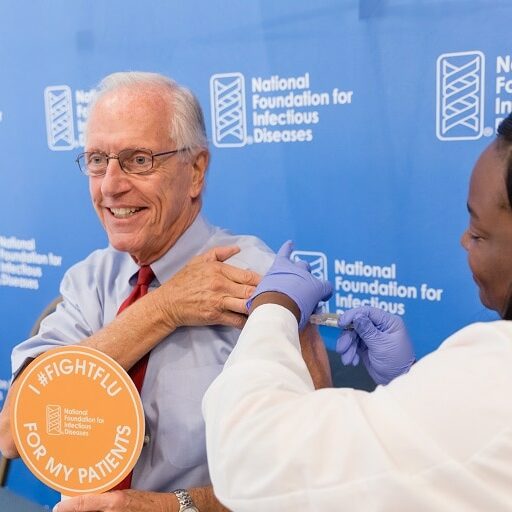 William Schaffner, MD, is past medical director of the National Foundation for Infectious Diseases (NFID) and formerly served as NFID liaison to the Advisory Committee on Immunization Practices (ACIP) at the Centers for Disease Control and Prevention (CDC).
William Schaffner, MD, is past medical director of the National Foundation for Infectious Diseases (NFID) and formerly served as NFID liaison to the Advisory Committee on Immunization Practices (ACIP) at the Centers for Disease Control and Prevention (CDC).
He is also past president of NFID and is a member of other professional societies, including the Infectious Diseases Society of America, American College of Physicians, Society of Healthcare Epidemiology of America, and American Public Health Association. He is active in the field of infectious disease research and has authored or co-authored more than 400 published studies, reviews, and book chapters on infectious diseases. He has served on the editorial board of several scientific journals, including the Journal of Infectious Diseases, Vaccine, and the CDC Morbidity and Mortality Weekly Report, and is also a featured guest author for Infectious Disease News.
His work has focused on all aspects of infectious diseases including epidemiology, infection control, and immunization. He has received numerous national awards for his work, including the inaugural 2017 National Vaccine Program Office UpShot Award for excellence in vaccine communication; the 2013 John P. Utz Leadership Award from NFID for his longstanding service to the organization and to the field of infectious diseases; and the 2009 James D. Bruce Award from the American College of Physicians for distinguished contributions to preventive medicine. He is a professor of preventive medicine and infectious diseases at Vanderbilt University School of Medicine and he has worked extensively on the effective use of vaccines in adult populations.
Schaffner co-hosts Infectious IDeas, an NFID podcast series featuring thought-provoking conversations with leading experts. Guests include humble heroes and future leaders working together towards a shared vision of healthier lives for all through effective prevention and treatment.
Areas of Expertise:
- Adult immunizations
- COVID-19
- Hepatitis B
- Influenza (flu) prevention and treatment
- Impact of flu in adults with chronic health conditions
- Immunization amid the COVID-19 pandemic
- Outbreak response
- Pneumococcal disease prevention
- Vaccine confidence and vaccine hesitancy
Quotes:
“A flu vaccine only protects against influenza (flu), not the coronavirus. And while its effectiveness varies from year to year, people vaccinated against flu don’t get as sick, avoiding pneumonia, hospitalization and death.” Source: Associated Press
A new survey from the National Foundation for Infectious Diseases found just 45% of adult patients say they’ve been vaccinated. “It’s very concerning,” said Dr. Schaffner, “because that’s exactly the group that’s at highest risk of the complications of influenza, particularly pneumonia.” Source: CBS Miami
“Flu can cause immediate complications, including pneumonia, meningitis, and sepsis. Studies over the past decade show that even after the worst of the coughing, fever, and aches have passed, people are at increased risk for heart attacks and strokes in the two to four weeks after recovering from flu. The virus is even more nasty than you thought. Flu initiates a whole-body inflammatory reaction. The damage from flu continues even after one recovers from the acute flu illness … It’s why many people feel wiped out for two weeks or more after they’ve stopped coughing. This lingering inflammation can involve blood vessels, particularly the blood vessels to the heart and the brain.” Source: Everyday Health
“Vaccines are not just for children anymore. Over the years, a number of vaccines have been developed and now recommended for the adult population and particularly the middle age and older population, aged 50 and older.” Source: Infectious Diseases Consultant
“I think there are many people who were on the fence who were worried about things moving too rapidly and about possible side effects [of COVID-19 vaccines], but those concerns are being allayed as they see more of their friends and acquaintances celebrating getting vaccinated.” Source: The New York Times
To arrange an interview, contact: Diana Olson, dolson@nfid.org, 301-656-0003 x140
Visit the NFID Newsroom for spokespeople, news conferences, and press releases.
To join the conversation and get the latest news on infectious diseases, follow NFID President and NFID on Twitter, like us on Facebook, follow us on Instagram, visit us on LinkedIn, listen to the Infectious IDeas podcast, and subscribe to receive future NFID Updates.
Updated January 2023

